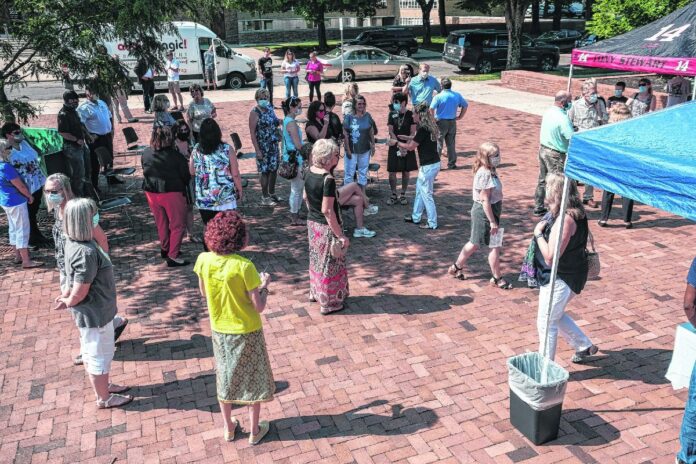
Organizers of local food Blessing Boxes have seen an increasing need for food due to continued community struggles triggered by the COVID-19 pandemic.
In downtown Columbus, one box coordinated by First Christian Church sits at the front of the First Christian Church Youth Center at 541 Fourth St.
The other, coordinated by the Tony Stewart Foundation, the Bartholomew County Public Library and the Columbus Area Chamber of Commerce, sits nearby on the Bartholomew County Public Library Plaza at 536 Fifth St. Burt’s Pest Control also provides support for the plaza box.
The simple, practical outreaches, unlocked and stocked with non-perishable food from beans to snacks — along with some toiletries from time to time — is part of a response to unemployment triggered by the COVID-19 crisis, according to organizers.
[sc:text-divider text-divider-title=”Story continues below gallery” ]
A sign on the front of First Christian’s box reads simply: “Leave what you can. Take what you need.”
“Obviously, the need is very real,” said Nancy Lewis, connections minister at First Christian Church, where leaders launched its Blessing Box in March. “We have a hard time keeping ours full.
“The biggest success in my mind, beyond the obvious part of meeting people’s needs, is that unconditional agape love and the no-strings-attached giving. No conditions. And it’s been especially beautiful because we have been able to build relationships with those who have come there for help.”
First Christian’s staff has helped some of those with needs far beyond food.
“And the threads from the Blessing Box include the number of people from out in the community who put things into it,” Lewis said. “And these are not our church members.”
Lewis said that one person not long ago stopped to unload a substantial supply of food into the outdoor cabinet, and she thanked him for such an act of kindness.
“It’s my pleasure to now give back,” the man explained, adding that, months before, he was jobless and picked up food from the shelves when he struggled the most.
First Christian member Rachel Kerschner and her family have regularly reached out to the struggling with meals they cooked for them in public spaces such as Mill Race Park or care packages they would distribute. They were among those who helped launch the Blessing Box, and loved the anonymity of it as much as anything.
People can come at any hour and have needs met with no questions asked and without being embarrassed by their predicament.
“I think the idea of people just being aware that it’s there is huge,” Kerschner said.
Angela Eck, assistant director at the library, said the Blessing Box there has been a help to the needy.
“We’re really glad it’s there, especially during this time when so many people are experiencing food insecurity,” Eck said.
Erica Raisor, director of the Tony Stewart Foundation, mentioned that she restocks the library plaza Blessing Box at least once per week with items such as chicken salad or tuna salad, while others are refilling it on separate days. In a few weeks, she’ll be focusing on more than items inside the box.
“We’re going to touch it up a bit and make sure everything is nice and sturdy as we head into the more harsh winter season,” Raisor said.
Lewis sees the church’s Blessing Box through the lens of one additional positive element among Christians aiming to reach people where they are practically and emotionally.
“Some of the people coming to the Blessing Box are some who might never step foot into our big church buildings here in town,” she said.




